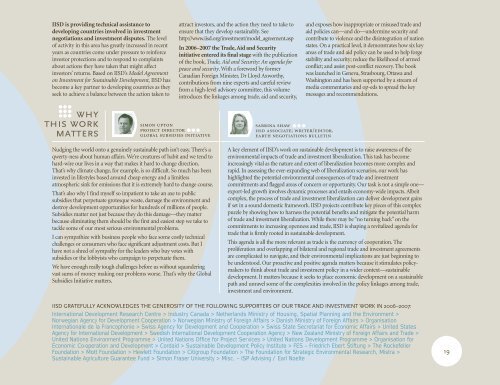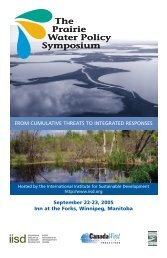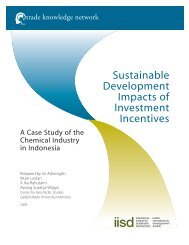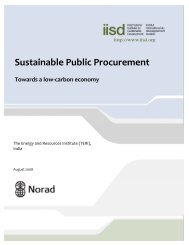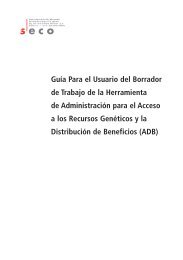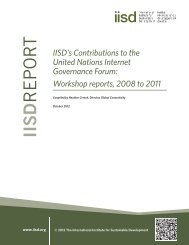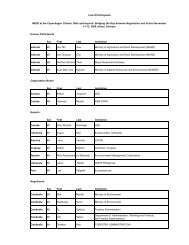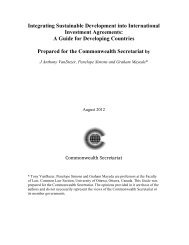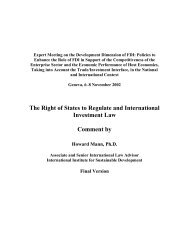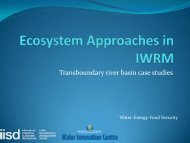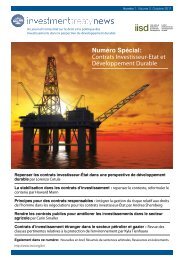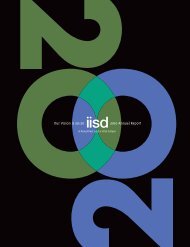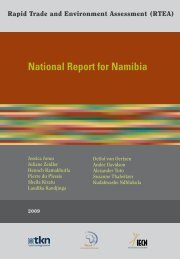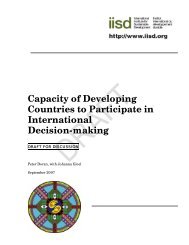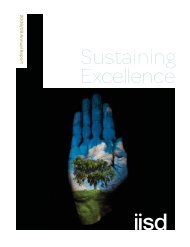2006/2007 Annual Report - International Institute for Sustainable ...
2006/2007 Annual Report - International Institute for Sustainable ...
2006/2007 Annual Report - International Institute for Sustainable ...
You also want an ePaper? Increase the reach of your titles
YUMPU automatically turns print PDFs into web optimized ePapers that Google loves.
IISD is providing technical assistance to<br />
developing countries involved in investment<br />
negotiations and investment disputes. The level<br />
of activity in this area has greatly increased in recent<br />
years as countries come under pressure to rein<strong>for</strong>ce<br />
investor protections and to respond to complaints<br />
about actions they have taken that might affect<br />
investors’ returns. Based on IISD’s Model Agreement<br />
on Investment <strong>for</strong> <strong>Sustainable</strong> Development, IISD has<br />
become a key partner to developing countries as they<br />
seek to achieve a balance between the action taken to<br />
attract investors, and the action they need to take to<br />
ensure that they develop sustainably. See<br />
http://www.iisd.org/investment/model_agreement.asp<br />
In <strong>2006</strong>–<strong>2007</strong> the Trade, Aid and Security<br />
initiative entered its final stage with the publication<br />
of the book, Trade, Aid and Security: An agenda <strong>for</strong><br />
peace and security. With a <strong>for</strong>eword by <strong>for</strong>mer<br />
Canadian Foreign Minister, Dr Lloyd Axworthy,<br />
contributions from nine experts and careful review<br />
from a high-level advisory committee, this volume<br />
introduces the linkages among trade, aid and security,<br />
and exposes how inappropriate or misused trade and<br />
aid policies can—and do—undermine security and<br />
contribute to violence and the disintegration of nation<br />
states. On a practical level, it demonstrates how six key<br />
areas of trade and aid policy can be used to help <strong>for</strong>ge<br />
stability and security; reduce the likelihood of armed<br />
conflict; and assist post-conflict recovery. The book<br />
was launched in Geneva, Strasbourg, Ottawa and<br />
Washington and has been supported by a stream of<br />
media commentaries and op-eds to spread the key<br />
messages and recommendations.<br />
why<br />
this work<br />
matters<br />
simon upton<br />
project director<br />
global subsidies initiative<br />
sabrina shaw<br />
iisd associate; writer/editor.<br />
earth negotiations bulletin<br />
Nudging the world onto a genuinely sustainable path isn’t easy. There’s a<br />
qwerty-ness about human affairs. We’re creatures of habit and we tend to<br />
hard-wire our lives in a way that makes it hard to change direction.<br />
That’s why climate change, <strong>for</strong> example, is so difficult. So much has been<br />
invested in lifestyles based around cheap energy and a limitless<br />
atmospheric sink <strong>for</strong> emissions that it is extremely hard to change course.<br />
That’s also why I find myself so impatient to take an axe to public<br />
subsidies that perpetuate grotesque waste, damage the environment and<br />
destroy development opportunities <strong>for</strong> hundreds of millions of people.<br />
Subsidies matter not just because they do this damage—they matter<br />
because eliminating them should be the first and easiest step we take to<br />
tackle some of our most serious environmental problems.<br />
I can sympathize with business people who face some costly technical<br />
challenges or consumers who face significant adjustment costs. But I<br />
have not a shred of sympathy <strong>for</strong> the leaders who buy votes with<br />
subsidies or the lobbyists who campaign to perpetuate them.<br />
We have enough really tough challenges be<strong>for</strong>e us without squandering<br />
vast sums of money making our problems worse. That’s why the Global<br />
Subsidies Initiative matters.<br />
A key element of IISD’s work on sustainable development is to raise awareness of the<br />
environmental impacts of trade and investment liberalization. This task has become<br />
increasingly vital as the nature and extent of liberalization becomes more complex and<br />
rapid. In assessing the ever-expanding web of liberalization scenarios, our work has<br />
highlighted the potential environmental consequences of trade and investment<br />
commitments and flagged areas of concern or opportunity. Our task is not a simple one—<br />
export-led growth involves dynamic processes and entails economy-wide impacts. Albeit<br />
complex, the process of trade and investment liberalization can deliver development gains<br />
if set in a sound domestic framework. IISD projects contribute key pieces of this complex<br />
puzzle by showing how to harness the potential benefits and mitigate the potential harm<br />
of trade and investment liberalization. While there may be “no turning back” on the<br />
commitments to increasing openness and trade, IISD is shaping a revitalized agenda <strong>for</strong><br />
trade that is firmly rooted in sustainable development.<br />
This agenda is all the more relevant as trade is the currency of cooperation. The<br />
proliferation and overlapping of bilateral and regional trade and investment agreements<br />
are complicated to navigate, and their environmental implications are just beginning to<br />
be understood. Our proactive and positive agenda matters because it stimulates policymakers<br />
to think about trade and investment policy in a wider context—sustainable<br />
development. It matters because it seeks to place economic development on a sustainable<br />
path and unravel some of the complexities involved in the policy linkages among trade,<br />
investment and environment.<br />
IISD GRATEFULLY ACKNOWLEDGES THE GENEROSITY OF THE FOLLOWING SUPPORTERS OF OUR TRADE AND INVESTMENT WORK IN <strong>2006</strong>–<strong>2007</strong>:<br />
<strong>International</strong> Development Research Centre > Industry Canada > Netherlands Ministry of Housing, Spatial Planning and the Environment ><br />
Norwegian Agency <strong>for</strong> Development Cooperation > Norwegian Ministry of Foreign Affairs > Danish Ministry of Foreign Affairs > Organisation<br />
<strong>International</strong>e de la Francophonie > Swiss Agency <strong>for</strong> Development and Cooperation > Swiss State Secretariat <strong>for</strong> Economic Affairs > United States<br />
Agency <strong>for</strong> <strong>International</strong> Development > Swedish <strong>International</strong> Development Cooperation Agency > New Zealand Ministry of Foreign Affairs and Trade ><br />
United Nations Environment Programme > United Nations Office <strong>for</strong> Project Services > United Nations Development Programme > Organisation <strong>for</strong><br />
Economic Co-operation and Development > Cordaid > <strong>Sustainable</strong> Development Policy <strong>Institute</strong> > FES – Friedrich Ebert Stiftung > The Rockefeller<br />
Foundation > Mott Foundation > Hewlett Foundation > Citigroup Foundation > The Foundation <strong>for</strong> Strategic Environmental Research, Mistra ><br />
<strong>Sustainable</strong> Agriculture Guarantee Fund > Simon Fraser University > Misc. – ISP Advising / Earl Noelte<br />
19


